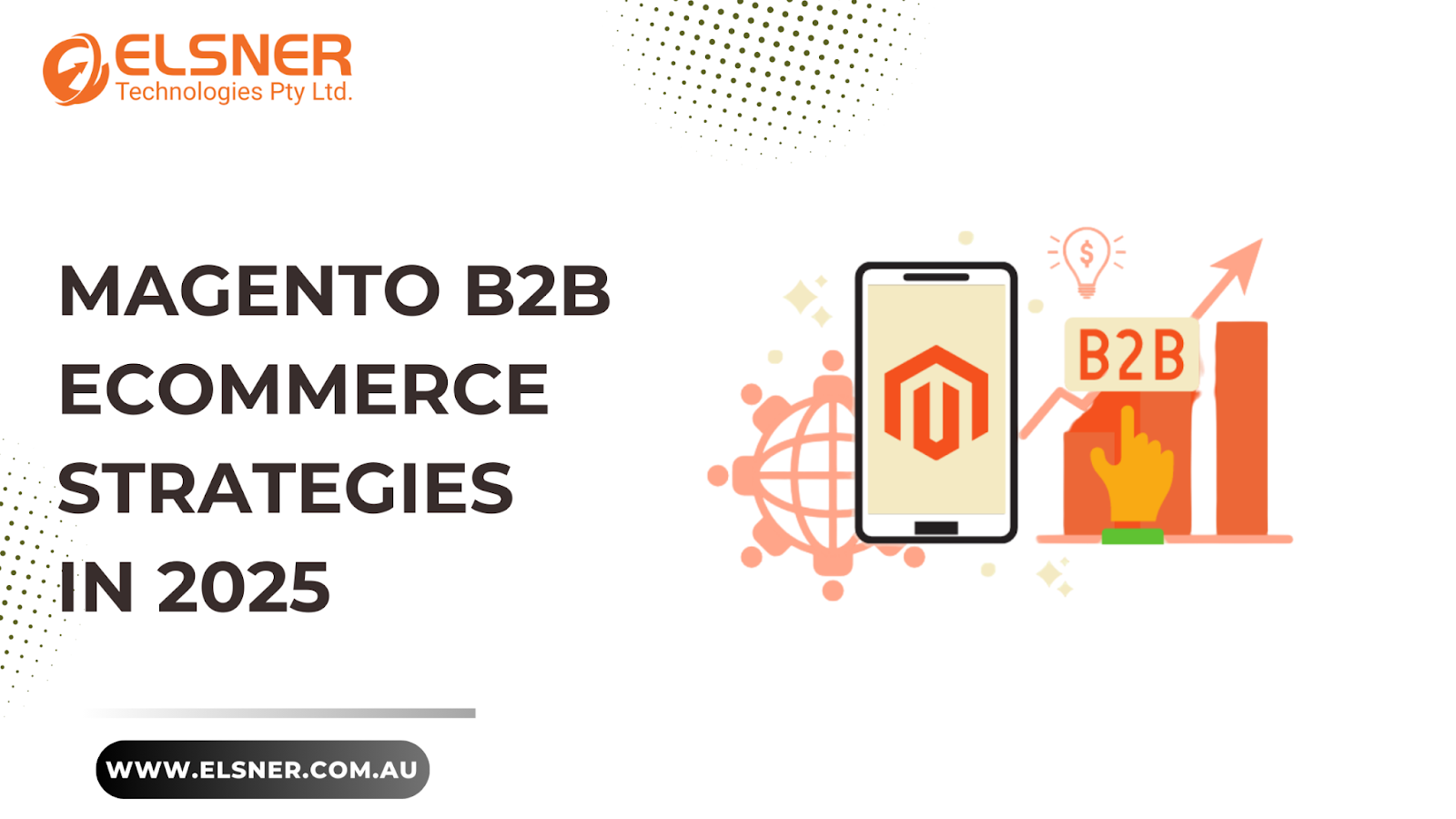
Amid the ever-changing B2B ecommerce landscape, businesses continually evolve new strategies to stay afloat. Among the leading solutions for companies looking to bolster their presence in the digital realm, create exceptional customer experiences, and enhance their sales is Magento B2B Ecommerce.
With its powerful tools, flexible customisation, and robust scalability, Magento for B2B Businesses has provided everything companies need for a success-laden future, even as early as 2025.
For this reason, the following guide will examine good B2B e-commerce strategies. We will also showcase some of the best Magento B2B Features and discuss the partner benefits of working with experts such as Magento development Sydney.
Choose Magento as your B2B Ecommerce Platform in 2025
Magento is specially designed for complex B2B needs. Because of bulk, customised pricing, and a convoluted buyer journey, the B2B provider has specific and special solutions to bridge the gap.
Why is Magento Important for B2B businesses?
Highly Customisable Platform:
Its open-source nature enables developers to build particular features designed for your business.
This would be an example of a workflow that can be developed with a Magento developer Sydney’s help, where the workflow matches the buying behaviour of your client.
Scales Up Brew Business:
Scaling traffic, product catalogues, and order volumes is handled efficiently by Magento as your B2B store expands.
Flexible Pricing Strategies:
Dynamic pricing strategies include bulk discounts, contract-based pricing, and customer-specific rates.
Integration is Completely Seamless:
ERPs, CRMs, as well as inventory management systems integrated with Magento ensure that the business processes run very smoothly.
Complex Reporting and Analysis:
Magento fetches deep insights for tracking buyer behaviour, order trends, and conversion rates—all crucial for B2B success.
Partnering with experts in Magento development in Melbourne can ensure that the Magento store is customised for optimum efficiency.
Key Growth Enablers of the Magnificent Magento B2B Feature in 2025
Magento’s business-specific features have been developed to automate B2B complexities, enhance customer experience, and generate conversions. You will overcome your competitors if you know how to use these tools.
1. Customer Segmentation for Personalised Marketing
- Clients can be divided based on the following criteria: industry, company size, number of purchases, etc.
- Deliver product catalogues, pricing, and promotions to individual clients.
For example, a Magento agency Sydney can help you implement dynamic segmentation to improve sales performance.
2. Quote Management System
- Magento quote management enables customers to do the following directly from a product page:
- Ask for quotes on products and preview the custom pricing before bulk ordering.
- Purchase on-site within the platform for easy negotiation.
- It attracts any company that applies Magento e-commerce growth strategies to broaden its consumer base.
3. Managing Corporate-Buyer Accounts
With the Magento B2B Features, buyers can create company accounts with several users and defined roles. This enables clients to:
- Oversee multiple employee logins.
- Control permissions for purchases, invoices, and order histories.
4. Payment Flexibility
Magento supports several methods of payment on its B2B side,
- Bank transfer mode of payment
- Credit limits
- Scheduled payments
A Magento developer Australia expert will be able to customise and integrate the best payment gateways required for your business model.
5. Advanced Inventory Management and Catalog Management
- Handling big product catalogues is a key feature in B2B Commerce. It allows for
- Client-group-specific catalogues.
- Tier pricing on bulk orders.
- Real-time stock updates between warehouses.
Winning B2B E-commerce strategies for 2025
With all said and done, combining Magento’s strong features with shrewd strategies will enable a business to survive in a cutthroat atmosphere. Here is how:
1. Optimise Your Magento Store for Speed and Performance
- Depending on the type of traffic, use caching such as Varnish or Redis.
- Compress images and enable lazy loading for fast page loading.
- Find a Magento 2 developer Melbourne who will help configure your server in the best way.
2. Personalisation to Bring in Customer Engagement
Using segmentation tools for Magento Ecommerce Growth, businesses can now send out hyper-targeted content, such as:
- Personalised product recommendations.
- Customised email campaigns.
- Targeted promotions for different customer groups.
- Personalisation equals engagement, conversion, and loyalty.
3. Set Up a Self-Service Portal
B2B buyers appreciate offerings that allow them to self-service to an increasing extent. A dedicated portal will enable clients to:
- Track orders
- Manage account information
- Custom pricing
- Download invoices
Providing a seamless self-service experience is key to driving efficiency and satisfaction.
4. Implement Automation for Efficiency
Automating repetitive tasks minimises human interference and increases accuracy. Some of the activities that can be automated with Magento include:
- Updating inventory
- Email campaigns
- Processing orders
An experienced Magento developer in Sydney will implement advanced automated solutions.
5. Use Data-Driven Insights for Better Decision Making
Magento has built-in tools that can help track essential KPIs, including:
- Sales trends
- Conversion-rates
- Categories of products in demand
Once the data has been analysed, the marketing strategy and customer experiences can be developed.
Optimising Your Magento Store for the Growth Horizon
Ensuring that your Magento store will thrive in 2025 depends on optimising performance, security, and user experience. A properly optimised B2B Online Store with Magento would attract people and keep them there, engaging them, and converting them into loyal customers.
1. Enhance Site Navigation
Smooth navigation is an absolute prerequisite for a good user experience. The first step is layering navigation to allow customers to filter their products using attributes like size, color, or price. This should be an easy way for Magento B2B Ecommerce buyers to find specific items from large product catalogues. Also, improving the search bar with auto-suggestions and tracking keywords will greatly enhance search accuracy so that users find what they need in no time.
2. Keep Mobile Optimisation in Sight
Given the rising popularity of mobile devices for Magento for B2B business transactions, it is essential for a Magento store to provide a solid mobile experience. Make sure its design is touch-friendly, featuring larger buttons and optimised product images. Quick checkout features and enhanced page speed through image compression and caching will make a real difference for mobile and keep your conversions high.
3. Build, Manage Live Chat, And Support Tools
Installing live chat or AI chatbots proactively helps customers with their queries in real time. This type of customer support further improves customer satisfaction by quickly addressing their doubts. It thereby reduces cart abandonment rates, which is important in B2B clients who usually place bulk orders.
4. Heightened Security With Magento Updates
Consistent Magento 2 security patches were pushed for an update, and vulnerabilities were fixed. Any delays in applying the updates open doors for more cyber threats targeting an online store. Having a trusted Magento developer in Australia by your side helps you maintain timely updates that work for your website’s security and performance.
5. Come up With a Custom Shipping Solution
B2B buyers typically require customised shipping options. Magento can calculate real-time shipping rates and supports multiple delivery options for bulk orders. By consulting Magento development Melbourne, custom shipping solutions can be created easily according to your client’s needs.
Measuring B2B Ecommerce Success
Monitoring key performance indicators (KPIs) becomes necessary to gauge the success of your Magento B2B E-Commerce store. Once these metrics are assessed, areas of improvement in customer interaction can be identified, and strategies can be modified.
- Conversion Rate: This KPI calculates the percentage of visitors to your site who buy from it. Therefore, a higher conversion rate directly correlates to your product listings, checkout process, and overall site experience, facilitating sales.
- Average Order Value (AOV): The AOV lets you determine purchase trends concerning bulk orders and high-value transactions typical for B2B Ecommerce Solutions. Increasing AOV will heavily influence revenue in the long run.
- Customer Retention Rate: Repeat customers are critical to the long-term growth of your business. Tracking this parameter could show you how effectively you operate with loyalty programs, customer service, and marketing campaigns.
Final Thoughts
Enabling B2B Ecommerce for Magento store optimisation will give massive growth to your business in 2025 if the correct strategies are employed. Leverage all Magento features, apply store optimisation, and collaborate with experienced partners, such as a Magento developer in Australia or a Magento agency in Sydney, to build a successful B2B ecommerce platform.
Position your customer-centric strategies with automation and keep a secure platform for sustainable growth, whether you grow a B2B existing store or a start-up with Magento in your journey towards success in today’s dynamic ecommerce landscape.
Frequently Asked Questions
1. What makes Magento perfect for B2B Ecommerce?
With its advanced features, such as custom catalogs, bulk ordering, and automated pricing, Magento is the ideal platform for B2B businesses. It also offers high flexibility, scalability, and powerful integrations.
2. How do I boost my Magento store’s performance for B2B customers?
To improve performance, you can allow speed improvements, use a CDN, and optimise your database. Partnering with a Magento developer in Sydney will also provide you with expert advice.
3. What are the best Magento B2B wholesaler features?
With quote management, custom pricing, and inventory holding features, Magento for B2B businesses is the best environment for wholesalers who wish to easily carry out bulk transactions.
4. Is Magento suitable for small B2B businesses?
Magento is the perfect scalable solution for both small and enterprise companies. Smaller B2B companies can implement their original and custom features as they grow after starting with smaller functionality.
5. How should I improve my Magento store’s on-page SEO?
Keyworded and optimised product descriptions showing such phrases as Magento development Sydney and Magento agency Sydney.
- Enhanced search engine visibility through implementing structured data for use.
- Establish extensive product pages featuring specific content.
Write and Win: Participate in Creative writing Contest & International Essay Contest and win fabulous prizes.


